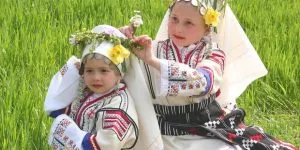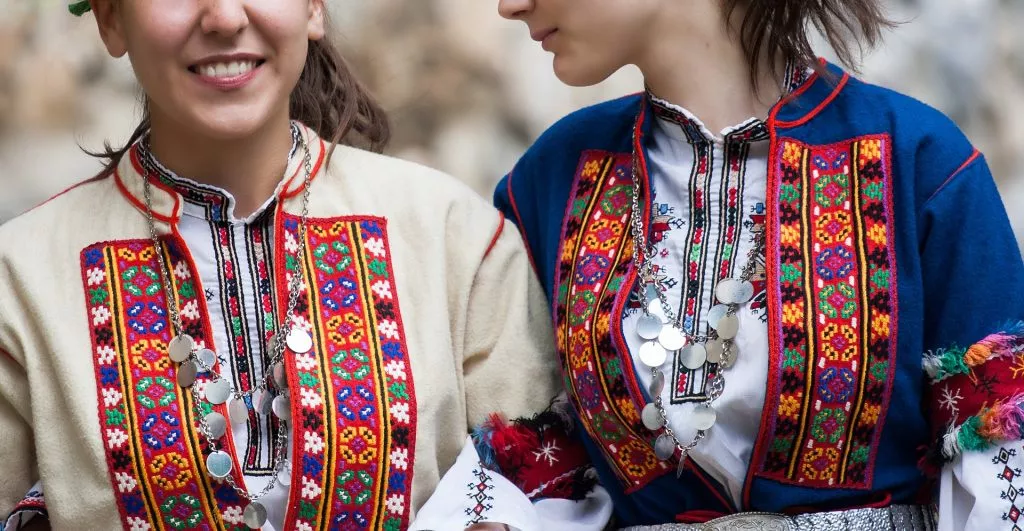Bulgarian holidays and customs
Bulgaria is rich in holidays and various traditions that are still observed today in different corners of the country. We have collected all the larger ones in one article Bulgarian celebrations indicating what the customs are in them, what should be present at the table and of course who is celebrating.
Here is a list of the most important holidays in Bulgaria:
St. Basil's Day
St. Basil's Day or Survaki, Surva is celebrated on January 1st (January 14th AD) and is a Bulgarian national holiday marking the beginning of the new calendar year. It is known in all Bulgarian ethnic territories.
Nouns: Vasil, Vasilka, Vasko, Vaska, Valchan, Valcho, Veselin, Veselina, Vesela, Vasa, Valko, Vesco, Veselka, Veska
Customs
In the folk calendar, St. Basil's Day is called Survaki because of the custom of survakan. According to an old Bulgarian tradition, children, between 5 and 12 years old, leave in the early hours of January 1 and go around the homes of relatives, neighbors and friends with survakniki in their hands to bless the hosts for health and prosperity. Survakniki were made from raw dogwood sticks, shaped like the letter F, which were decorated with wool, twisted white and red yarn, cowpeas, popcorn and dried fruit. See more at the link below

Jordan Day - Epiphany
The day is celebrated on January 6 and is associated with the baptism of Jesus Christ by John the Baptist. The holiday is named so because on this day everyone who wants to be healthy during the year bathes or at least washes in the river. The holiday marks the end of the so-called "dirty days".
Nouns: Bancho, Bistra, Bogdan, Bogdana, Bogolyub, Bogolyuba, Bogomil, Bojan, Bojana, Bozhidar, Bozhidara, Bozhil, Boncho, Borislav, Borislava, Boyan, Boyana, Danka, Danko, Dancho, Jordan, Jordana, Jordanka, Nayden, Theodosius
Customs
On Jordan Day, a cross is ritually thrown into a pool of water, and men jump into the icy waters to retrieve it. On this day, tradition dictates after the ritual water baptism, for the priest to throw the cross into the river or into the sea, where the assembled men should rush in to take it. The one who took out the cross will be healthy and happy throughout the year. See more at the link below
Midsummer's day
The day is celebrated every year on January 7. It is connected with honoring the memory of St. John the Baptist - the last Old Testament prophet and baptizer of Jesus. John the Baptist is also called "Forerunner" because he went before Christ and prepared people for his birth.
Nouns: Ivan, Ivanka, Ivanina, Vanina, Banya, Vanyo, Ioan, Ioana, Kaloyan, Yovko, Yovka, Ivaylo, Ivayla, Ivo, Ivona, Jean, Zhana, Jana
Customs
On this day, married couples visit their godparents, as John the Baptist is considered the patron saint of godparents. Couples exchange gifts and a rich meal is prepared.
As a continuation of St. John's Day, rites related to the healing power of water continue during St. John's Day. Everyone who got married a year ago takes a bath. Brides and grooms must be publicly bathed by the best man or brother-in-law. It is accepted as an element of post-wedding customs that completely closes the circle of the wedding ceremony. The bachelors bathe the maidens, and all namesakes must also bathe. See more at the link below
Babinen
Babinden is celebrated on January 8 (January 21 old style). The holiday is dedicated to the health of children, grandmothers - midwives and women in labor.
Customs
Even before sunrise, mothers with children from one to three years of age go to the fountain to pour fresh water. A sprig of basil or geranium is placed in the cauldron with the water. They take a bar of soap and a new towel and head to the grandmother's house to "water" her. The ritual watering of the grandmother-midwife is performed under a fruit tree in the garden, on the lawn or in front of the stairs. Each woman hands the grandmother the soap, pours her water to wash herself, and presents her with the towel she has brought. The grandmother adorns the bride with a bunch of geraniums, tied with "martenichka" - red and white thread. See more at the link below
Antonov day
Antonovden is celebrated every year on January 17. On this day, the memory of St. Anthony the Great is honored.
Nouns:
Anton, Andon, Antoine, Antonia, Antonina, Antoinette, Toncho, Tonya, Doncho, Donko, Donka
Customs
According to folk beliefs, Antonov's Day is one of the bad holidays and its celebration is mandatory, as this way we will protect ourselves from diseases. On this day, women should not knit or sew, because if they stab themselves, the wound will not heal quickly. They should not boil beans, lentils, corn, or other pulses, lest the plague, blue pox, and smallpox be angered. See more at the link below
Athanasovden
On Athanasius Day, the memory of Saint Athanasius the Great is honored. It is celebrated on January 18.
Nouns: Atanas, Atanaska, Nasko, Nasya, Asya, Nastya, Tanyo, Zhivko, Zhivka, Tina, Nancy, Tanko, Tanka, Anya
Customs
Housewives slaughter a black chicken or hen, cook it with rice, then distribute it to relatives, friends and neighbors, calling for health. Their feathers are preserved because, according to folk beliefs, they have healing powers. See more at the link below
Rooster Day
On January 20 (February 2 old style) we celebrate Petlevden - the celebration of male births. The Orthodox Church celebrates Rev. Euthymius the Great, as well as Patriarch Euthymius of Turnovo
Nouns:
Evtim, Evtimii, Momchil, Radost, Radostin, Radostina, Drago, Dragomir, Vanessa, Ralin, Radina, Radoslav, Radislava, Sredko, Sredka and Sreten.
Customs
Rooster Day celebrates children and to protect them from diseases, a rooster or a rooster is raised for a boy or a girl respectively.
The rooster that crows is chosen since autumn. Mothers of boys put a rooster on the table. Tradition dictates that the sacrificial bird, cooked with cabbage or rice, be distributed to neighbors for the health of the boys. It is also believed that if the weather is good today, it will be like that for another 40 days. See more at the link below
Trifon's Day
Tryphon Zarezan or also called the Day of the Vintner is celebrated on February 1 (February 14 old style). The Bulgarian Orthodox Church celebrates Trifonov Day.
Nouns: Trifon, Trifonka, Lozan, Lozanka, Grozdan, Grozdanka, Radko, Radka, Racho
Customs
In the morning, only the men gather and make a cast. Then everyone gets together and chooses the "king of the vines", who is usually a wealthy man. Then the celebrations begin. See more at the link below
Big Stew: Customs and Table
Golyama Zadushnitsa is celebrated on the Saturday opposite Nedelya Mesopustna (Mesni zagovezni, which is a week before the beginning of Great Lent). A memorial service is held in memory of the dead.
All Souls' Day is always on Saturday, because in the weekly holiday cycle, the church has designated Saturday as the day of the dead.
Customs
Memorials are made for the dead at the grave, at home or in church. Usually at the grave, the priests perform the parastas because it is shorter than the requiem, which is the more extensive prayer for the repose of the souls and includes more prayers, as well as readings from the Gospel and apostolic text. Read more and see the dates for Big Stew at the link below.
Imported cheeses
Sirni Zagovezni is always celebrated on Sunday, seven weeks (49 days) before Easter. It is the last day before Great Lent in which foods of animal origin, such as cheese, milk, eggs, etc., can be eaten.
Customs
A fire is lit on Sirni Zagovezni, which is believed to burn the evil spirits with it. Fire is jumped for health and luck. The onkaliya (burnt kache with tar), oratniki (split wood with straw on it that is burned) and oruglici (tarred basket) are lit and rotated, the children and youth perform a ritual cleansing of the fields, to bring great blessings . Read more and see the dates for Sirni Zagovezni at the link below.
Todorovden
Todorovden is celebrated every first Saturday of Great Lent. On this day, the Orthodox Church honors Saint Todor.
Nouns: Todor, Todorka, Teodor, Teodora, Bozhidar, Teia, Thea
Customs
Young brides prepare ritual bread, in the shape of a horse or horseshoe. Bread is smeared with honey and boiled corn is stuck on it. After that, it is checked by the mothers-in-law and from there it is distributed to the relatives. See more at the link below
Annunciation
On March 25, we celebrate the Annunciation, also called Blagovets. The Orthodox Church celebrates the news of the Savior's birth. The Virgin Mary realizes that she has conceived a son who will be called Jesus and will be worshiped by all the people.
Nouns:
Blagovest, Blagovesta, Blagoy, Blaga, Blago, Evelina, Evangelina
Customs
In Bulgaria, the custom of Kukuvden is known. Special ritual songs are sung for the coming of spring. When a person hears the cuckoo on this day, he should touch bread so that the year will be fertile and rich. See more at the link below
Lazarus
Nouns:
Lazar, Lazarinka, Lazarina, Lazo, Lazarka, Lalka, Lalko, Lalo, Lala, Lalio, Lalyu
Customs

Flower Sunday
Palm Sunday is celebrated differently every year – one week before Easter, the Sunday after Lazarus Day.
Nouns
Today, everyone who bears names derived from the names of plants and trees is celebrating: Primrose, Peony, Violeta, Willow, Verban, Verbinka, Gergin(a), Grozdan(k)a, Dahlia, Dafina, Delia, Delyan(a), Dillian(s), Clover(s), Jasmine, Zdravka, Zdravko, Hyacinth(s), Willow, Primrose, Kalin(s), Camellia, Carnation(s), Kitka, Kamen, Latinka, Lily, Lila, Lilia, Liliana, Laura, Lyulina, Margarita, Magnolia, Raspberry, Marigold(s), Tsvetan(s), Ceno, Cvetelina, Ash, Sycamore, Petunia, Ralitsa
Customs
The most popular custom in celebrating Palm Sunday is related to the willow branches. Christ enters Jerusalem, riding a donkey, and the people greet him with palm branches, which they spread on the ground at his feet, and with joyful shouts of "Hosanna". Read more and see the dates for Palm Sunday at the link below.
Easter
Easter is celebrated every first Sunday after the first spring full moon. The celebration begins on Monday and is called Holy Week.
Nouns:
Velichko, Velichka, Veliko, Velik, Velika, Veliko, Velimir, Velimira, Paska and Pascal.
Customs
We all know about the tradition of dyeing eggs for Easter. It is not known when eggs first began to be dyed. Read more and see the dates for Easter at the link below.
St. George's Day:
Every year on May 6, we celebrate St. George the Victorious - the familiar St. George's Day. The day is an official holiday of the Republic of Bulgaria.
Names: Georgi, Gergana, Genoveva, Ganka, Gencho
Customs
On the morning of St. George's Day, the mistress of the house gets up and sweeps the yard. Then she decorates the doors with a bouquet of geraniums, lilacs and a blossoming branch of a fruit tree. See more at the link below
Cherries-soul day
Cherry stew, also known as Spasova stew, is celebrated on the Saturday before Peter's fast. It is a time to honor our deceased loved ones.
Customs
It is believed that on this day the souls of all the deceased who have remained at large since Maundy Thursday come home.
On this day, a special service is held in all churches and temples in memory of the dead. In this way, the living beg forgiveness from God for their dear ones who are no longer among us. On Chereshova Dudushnitsa, as on any other Dudushnitsa, the relatives of the deceased go to the cemeteries to honor their memory. Read more and see dates for Cherry Stew at the link below.
Midsummer
On June 24 we celebrate Midsummer. The Eastern Orthodox Church celebrates the birth of St. John the Baptist.
Nouns:
Encho, Enyo, Dayan, Diana, Denitsa, Dilyan, Dilyana, Diyan/Dian, Diyana/Diana, Deyan/Dean/Deya/Dea, Deyana/Deana, Bilyan, Bilyana and names of herbs.
Customs
According to the beliefs of this day, the length of the day begins to decrease. There is also a belief that on the night before Midsummer, where there is a buried treasure, a blue flame comes out of the ground and shines brightly. See more at the link below.
St. Peter's Day
Every year on June 29 we celebrate St. Peter's Day.
Nouns:
Peter, Petya, Pavlina, Polina, Kamen, Pavel
Customs
St. Peter's Day is preceded by a two-week St. Peter's fast that begins the first week after Pentecost. See more at the link below.
Ilinden
On Ilinden, July 20, we honor the Holy Prophet Elijah.
Nouns:
Ilia, Ilinda, Ilian, Ilin, Iskra, Ilina, Iliana, Ilinka, Ilian, Iliana, Ilko, Ilcho, Ilka, Lina, Licho, Yulia
Customs
One of the biggest customs of Ilinden is the sacrifice, the oldest rooster is sacrificed. See more at the link below.
Great Mother of God
On August 15, we celebrate one of the greatest Christian holidays, the Assumption of the Virgin Mary, or Great Virgin.
Ienniki
Mara, Maria, Mariyka, Mari, Marin, Marian, Marijana, Mariana, Marian, Masha, Mika, Mira, Marieta, Mariela, Mario, Preslav and Preslava, Despina.
Customs
This is the day on which the Holy Mother is honored - the patroness of motherhood, women and the family hearth. See more at the link below.
Easter
Easter is celebrated on September 14. It is one of the Twelve Great Christian Holidays.
Nouns
Krastyo, Krastina, Krastinka, Christina, Christian, Christiana, Kuncho, Stavri
Customs
On Epiphany, the cross is brought into the middle of the church for the faithful to worship. A water consecration is held and the priests sprinkle a cross on the homes for blessing. See more at the link below.
Friday:
Petkovden is one of the great national holidays, with which we mark the end of warm weather and the onset of winter. It is celebrated on October 14.
Nouns
Petko, Petka, Petkan, Petra, Petrana, Petrina, Petria, Petrichka, Petkana, Penko, Penka, Paraskev, Paraskeva, Parashkev, Parashkeva, Parush, Keva
Customs
The insemination of domestic animals, known among the people as "merlene" or "sheep wedding", is also common on Petkovden. While fertilization lasts, women should not take up any work - they do not knit and sew, they do not wash and they do not knead dough, in order to give birth to healthy and agile livestock. However, after the fertilization of the sheep, they bake fresh pies, which they distribute among themselves around the village. See more at the link below.
Dimitrov Day
On October 26, we celebrate Dimitrov Day. The Orthodox Church celebrates Saint Demetrius.
Nouns
Dimitar, Dimyslava, Dimitrina, Dimitria, Demetra, Dima, Dimka, Dimcho, Dimana, Mitko, Mitra, Mitka, Mitrana, Mita, Dian/a, Dian/a, Drago.
Customs
Dimitrovden is characterized by ritual divination - divination by the first guest. The rite here is called bulezen, bulezanje or polozka. It is believed that if the first litters are boys, more male animals will be born every year. If the wearer is a good and wealthy person, the year will be healthy, fruitful and prosperous. See more at the link below.
Archangel Stew
Archangel Stew is one of the three Great Stews (Great Stews), also known as Men's, Rangel's and Hrangel's Stew.
This is the last All Souls' Day of the year and it is celebrated on the first Saturday before Archangel's Day
Customs
In many regions of the country, on this day, a sacrifice is made for the saint and ritual breads are made, the shape of which resembles that of breads prepared for burial or commemoration. Read more and see the dates for Archangel Stew at the link below.
St. Andrew's Day
On November 30, we celebrate St. Andrew's Day. The Christian Church celebrates St. Apostle Andrew. The day marks the beginning of the Winter cycle of public holidays.
Nouns
Andrei, Andriyan, Andreya, Andro, Hraber, Hrabrin, Silen, Deshka, Parvan, etc.
Customs
In Northern Bulgaria, on this day they celebrate in honor of the bears, believing that St. Andrew is their master. According to folk legend, the saint defeated the bear, harnessed it to a plow and plowed the land. For this reason, from the cooked stew (most often corn) is thrown into the chimney with the words: "You bear, boiled corn, don't eat the raw and don't eat the people and the cattle!" It is still believed that the bear is the main part from the holiday, and as grandma does, she hangs a picture or something resembling a bear on the nearest wall to the table. See more at the link below.
Saint Mina
On November 11, we celebrate Saint Mina. From November 11, the "Wolf Holidays" begin. Even the shortest days begin with them.
Ienniki
Mina, Minka, Minko, Mincho, Victor, Victoria
Customs
At the beginning of November, the last days passed, during which our great-grandfathers allowed themselves to walk late at night, dance in the dark, and meet their loved ones after sunset. At that time, people were finishing all the repairs that had been started, mending fences and plugging the cracks through which tenz, karakonjol and other evil forces could sneak in. See more at the link below.
Nicholas Day
On December 6, we celebrate one of the biggest Christian national holidays, Nicholas Day.
Nouns
Nikola, Nikolai, Nikolina, Nicoleta, Nenka, Nina, Nino, Kolyo
Customs
Bulgarians honor Saint Nicholas as the patron of fishermen and sailors and as the lord of the vast expanse of water - the oceans, seas, rivers and lakes. According to folk beliefs, the saint causes sea storms and hurricanes. When he is angry, he gives free rein to the winds, shakes the sea and sinks the ships. Thus, on Nikulden, all gemia stop moving to propitiate and honor the patron saint. See more at the link below.
Ignazden
On December 20 we celebrate Ignazhden. The Orthodox Church celebrates St. Ignatius God-bearer, one of the best disciples of St. Apostle John the Theologian, so called because he carried God in his heart.
Nouns
Blamen, Blamena, Fiery, Fiery, Ignat, Ignat, Igo
Customs
According to the belief, on St. Ignazhden, the birth pains of the Mother of God also begin, then the gatherings of the carolers take place. That is why it is called New Day or Young Year. Ignazhden marks the beginning of the Christmas holidays. It is connected with the custom of polvavane, foretelling what the new year will be like. If the first guest is good and lucky, the family will enjoy prosperity and success throughout the year. See more at the link below
Christmas Eve
On December 24, we celebrate Christmas Eve or Little Christmas.
Nouns
Evgeni, Evgenia, Women, Noble, Noble, Malcho, Small, Malena, Malin
Christmas Eve marks the end of the forty-day Christmas fast, which began on November 15, Christmas Eve. According to popular belief, the Mother of God became pregnant on Assumption Day and gave birth to a young god on Little Christmas, but announced this the next day.
Customs
The whole family gathers for dinner. A New Year's Eve candle is lit and left to burn all night. Once everything is placed on the table, the family sits down and begins to eat. When everyone has finished eating, they get up from the table at the same time. The dining table is not assembled until the next morning, as it is believed that during the night the deceased loved ones will come to collect from the festive table. See more at the link below
Christmas
On December 25, we celebrate Christmas - the birth of Jesus Christ.
Nouns
Bozhidar, Bozhidara, Bojan, Bojana, Bozhin, Bozil, Emil, Emilia, Emmanuel, Emmanuela, Zvezda, Zvezdelina, Zvezdelin, Zvezdan, Zvezdyo, Hristo, Christian, Hristin, Hristofor, Itso, Christian, Christian, Chrissy, Hrisi, Christa, Christina, Christina, Christiana, Mladen, Mladena, Radoslav, Radoslava, Radomir, Radomira, Radostin, Radostina, Radina, Rayko, Radko
Customs
One of the greatest customs of Christmas is caroling. The time for caroling is strictly defined by tradition – from midnight to sunrise on Christmas Eve. As the sun rises, they lose this power and stop caroling. A rich and diverse folklore is associated with Christmas holidays, customs and rites: songs, nicknames, proverbs and riddles. Carol songs are performed during caroling - on Christmas Eve, groups of boys "carolers", led by an older man called "stanenik", go around a predetermined neighborhood and sing songs on the road, in front of the house and on the house, as the wishes in these songs are also dedicated to the householder, the shepherd, the hunter, the priest, the bride, the maiden, the bachelor, the little boy or girl. See more at the link below
St. Stephen's Day
Stefanovden is an Orthodox and folk holiday celebrated on December 27.
Nouns
Stefan, Stefka, Stefi, Stefko, Stefcho, Stanul, Stevan, Steven, Stepan, Stefa, Stefana, Stefanka, Stefania, Stephanie, Stamen, Stamena, Stan, Stana, Stane, Stanimir, Stanimira, Stanislav, Stanislava, Stancho, Svetlin Chanyo , Chanko, Chanka Venko, Venche, Veni, Veneta, Venka, Vencho, Vencislav, Wenceslav, Wenceslava, Vencislava, Stoyan, Stoyanka, Stoyko, Tsanko, Tsanka, Tsonyo, Tsonka, Tsonko, Tsoncho Stoil, Stoilka, Stoycho Zaprin, Stopped, Stopped, Stopped, Stopped
Customs
The holiday falls on the so-called dirty days, which are believed to harbor demons and evil forces. According to popular belief, women should not sweep, spin or wash their hair during these days. Men should not wash their shirts. It is believed that if these prohibitions are not followed, the violators will fall ill with bad diseases. See more at the link below











Comments are closed.